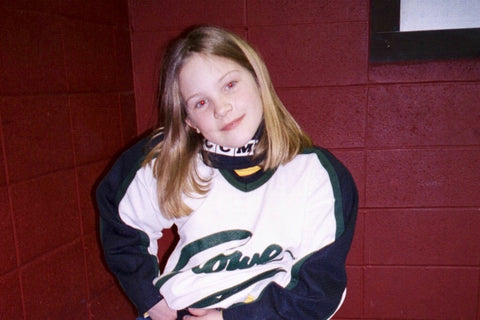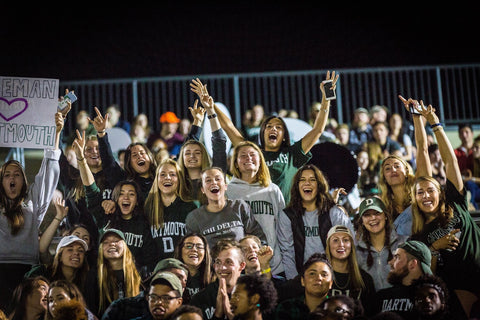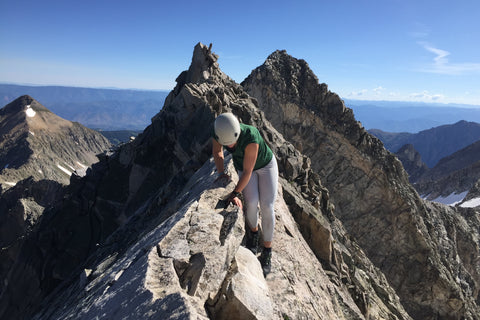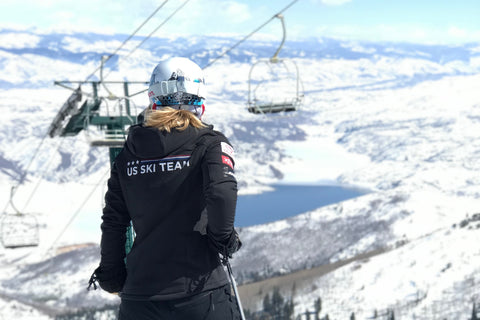As a former athlete and founder of The Sideline Perspective, Mackenzie St. Onge has made it her mission to unite sidelined athletes through their common experiences. Her experience as a two-sport NCAA Division I athlete at Dartmouth College who broke her collarbone during her senior year exposed her to the perspective of the “sidelined” athlete who no longer had daily competitive sports as an outlet.
As someone who relied upon and has always craved the challenges that were presented to her by sport, this time spent on the sidelines motivated her to take things into her own hands by creating a platform where injured and retired athletes can come together, share stories, support one another, and navigate their paths forward -- with purpose. The Sideline Perspective was born, and it’s been quite the hefty side-hustle!
Mackenzie took the time to chat with us about what it took to launch an empowering platform while juggling a full time job and life after sport.
Read on to hear how she fuels her path to entrepreneurial gr8ness while maintaining a healthy balance!

1. Walk us through your journey -- how did your passion for hockey start? When did you start playing, and what pushed you to continue playing? How did it (or did it?) influence your career choices?
Mackenzie St. Onge: Like many hockey players, I started skating when I was young. I fell in love with the feeling of speeding across a rink, playing tag with friends, and getting more and more comfortable on my skates. Pretty soon, skating felt as natural as walking or running and I loved the challenge of improving my game in other areas. At each level I was surrounded by coaches and teammates who both encouraged and challenged me to find my potential.
Now that I’m done playing, I still crave that encouragement and those challenges, and do my best to seek them out in the world of holistic athlete development where I now work. I chose this field because throughout my time in the sports world I have both seen and personally felt the need for balance among competitive athletes. Yes, dedication to the game is important, but it shouldn’t be at the cost of personal well-being, mental health, or future opportunities for success.

2. What is the biggest lesson you’ve learned as an athlete and that can be applied to “everyday” life?
MS: The biggest lesson I’ve learned as an athlete is how to communicate effectively with others. When you’re a part of a team, there are inevitably key moments of motivation, conflict, enthusiasm, or tension. Each requires its own nuanced language in order to hit home and be heard by a team full of unique and diverse athletes.

3. How did you decide to launch The Sideline Perspective?
MS: The Sideline Perspective was born out of a desire to bring sidelined athletes together through their experiences rather than leaving each individual to navigate the path on their own. TSP was designed to be community focused because no two experiences are the same. Its meant to be diverse, and to shine a light on the depth and breadth of which people are processing life after competitive sports or during an injury. There is no right or wrong way to move forward with life, and while none of us have the answers, we can share in our questioning together with the knowledge we’re not alone.
4. What’s one of the most important lessons you’ve learned (so far) as you grow The Sideline Perspective?
MS: It’s always important to have a clear vision in mind but it’s just as important that you stay flexible on how to get there. If you think you have to just follow one path, you may run into roadblocks that seem insurmountable or obstacles that seem bigger than they need to be. Stay flexible and stay creative and you’ll avoid unnecessary stress!
5. What has been the biggest challenge and biggest reward you've faced in your entrepreneurial journey?
MS: Time management has been difficult as I try to fit everything in among other jobs, but I think the essence of that is only have myself to be accountable to. In my other workspaces I have coworkers and bosses who hold me responsible for meeting deadlines and getting projects done, with TSP it’s just me. I miss having a ‘team’ in that respect!
Despite the difficulties with juggling everything that’s on my plate, I am motivated by the moments when an athlete reaches out and says TSP has genuinely helped or impacted them in some way. Those are the moments that remind me what I’m working towards is important, that there’s a need, and slowly but surely I can make a difference.
6. Tell us about your goals. What does success look like for you? Do you formally “goal-set?”
MS: Success to me is the simple knowledge that I’ve given my best. As an athlete that meant physically and mentally leaving it all on the ice, now that means being strategic, creative, and disciplined. It means no stone left unturned, no question left unasked, and no project left unfinished (even if it takes longer than I initially expected!). My favorite quote touches on this below...

7. What is your favorite quote to live by?
MS: “You have not failed until you stop trying.”
There are times when things get hard in life, when you can’t always sprint towards your goals and you have to jog, or sometimes catch your breath and walk. I love this quote because it is a reminder that the simple act of putting one foot in front of the other is still progress, that the flickering hope of success is still there so long as you’re willing to keep trying.
8. What advice do you have for hopeful future female entrepreneurs?
MS: Find community and ways that effectively hold you accountable - don’t be afraid to be vocal about your goals and ask for help! I’ve found the more I share my vision with others, the more I get the response “How can I support you?” I couldn’t do any of this on my own, and it’s been humility and a willingness to learn that have helped me the most.
9. Being an entrepreneur requires dedication, perseverance and just plain hard work. What fuels you both mentally and physically to run The Sideline Perspective while balancing all other aspects of your life?
MS: Fuel for me looks like personal connection and meaningful conversations. Whenever I think I’m stalled out it only takes one comment, one story, one conversation about the value of TSP to get me reoriented and back in a positive mindset on everything.
10. What’s your number one tip for anyone who wants to achieve gr8ness (greatness) in their lives?
MS: Be genuine, be curious, be kind.
11. What’s your favorite way to eat gr8nola?
MS: On top of a mountain as a summit snack! Otherwise at home as a smoothie bowl topping.








